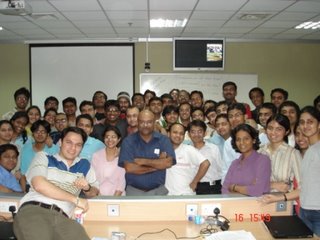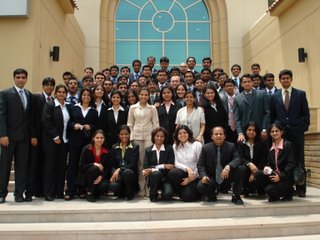This article lists my learning from Prof. Ram Kumar’s Marketing sessions and my thought extrapolations on the same. The professor left us with a few ideas and hints to provoke our thinking. This article is an attempt to finish the thought that he kindled.
Scenario 1:
How much does an average middle class person spend for the trousers and jeans he wears? Say Rs. 800 to 1000
How much does the same person spend for a shirt, T-shirt or a top? Say Rs. 500 to 700.
And how much does he/she spend on the undergarments? Hardly Rs 30.
The discrepancy is for all to see. People spend 70% of their life in their undergarments. Some people spend even more time in them; they take them off only during ablution and defecation. The undergarments are essential for our comfort and hence make the foremost contribution towards making us confident. If you doubt the confidence part then try wearing a misfit. Also, wearing a good quality undergarment prevents you from so many disorders. And yet we spend so less on them than the outer clothing we wear.
My take:
Isn’t this ‘individuality’ and ‘healthful living’ a marketing gap that undergarments companies should try to tap? Shouldn’t these companies appeal to every individual’s ‘dormant’ desire of living the life for himself or herself for a change?
Scenario 2:
On a normal day, how much time do we spend in the
washroom? 15-30 mins.
drawing room? Max 1.5 to 2 hours
Kitchen? Gender specific but say max 3-4 hours
Bedroom? Assuming a normal person sleeps for 8 hours, we spend atleast 9 hours there.
Now the critical question: which part of our house do we spend maximum on?
Undoubtedly it is the drawing room, right? We spend the most on that part of the house where we don't even spend our maximum time. Compare the money we spend on the drawing room sofa sets and their smooth velvet cushions with the amount you spend on the bedroom mattresses and pillows. Guests come and sit in the drawing room. That is the place that needs to be at its best then. Why should we spend on our bedroom where we go only to sleep? Isn’t it a stark contrast that speaks volumes of the neglect we subject ourselves to? Don’t we pay the price of this through stiff neck at best and spondylosis at worst? Isn’t this the kind of gap that furniture and mattress companies like Ikea need to tap?
My take:
As a society, we’ve evolved giving too much importance to others. We grew up getting conditioned to doing what our parents recommended and not doing what they forbid us from doing. Parents learnt those lessons from their parents and so on. But the essential basis of all those dos and don’ts has been the perspective of others towards our actions. People in our society have evolved wondering what other person in the society would think if they do this and not that. This overbearing importance given to others has forced us to undermine the importance we ideally should’ve given to ourselves. Somewhere, the huge disparity in our spending on our personal comfort through undergarments vis-à-vis the outer clothing or on our personal feel-good factor through bedroom spendings vis-à-vis those on drawing rooms is a fallout of this societal psychosis.
Scenario 3:
How much would the following people cost per month?
A good cook: Rs. 1000
A washerman: Rs. 800
A 24*7 house cleaner: Rs. 2000
A sex worker: Rs 10000
A Personal Relation manager: Rs 10,000
A 24*7 nanny: Rs 7000
A secretary to remind you of your important appointments and deadlines: Rs 6000
Now compare and contrast all these against the cost of a housewife.
My take:
Ergo, can the contribution of a housewife be considered as the sum total of all the above costs that you save? What about the intangible gain of peace of mind that comes from not having to worry about these scores of daily chores which helps you focus better on your core competence which is to become an efficient bread-winner for the family. Pardon me for the crudity of the comparison. While comparing the monetary value of house-wife is the last thing one should do, this comparison nevertheless brings out the stark contrast like none other. If only we could realize the qualitative value that a house-wife brings to our life, we would start looking up to her and give her her due rather than relegating her to a position of nonentity. The housewives themselves need to realize what they’re to the family. That would help them value their self-worth and respect what they do.
Marketing helps change people’s outlook. Certain things were never meant to be a certain way. But societal dynamics force people to make rules out of exceptions and vice-versa. There are always some innate human desires curbed under societal forces. Companies that identify such rules that conflict with the innate human spirit need to bring out and emancipate those souls hankering to break the shackle by attacking that dormant, implicit need. Companies need not go too far to innovate in terms of new products that generate newer needs. There are enough dormant needs that are curbed under the societal forces. The sooner the companies target them, the happier the society at large would be.












